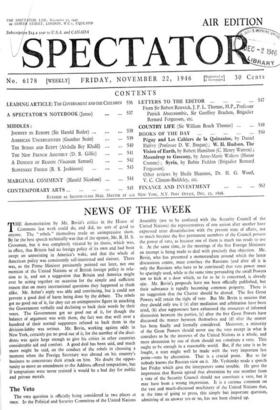The Veto
The veto question is officially being considered in two places at once. In the Political and Security Committee of the United Nations Assembly (not to be confused with the Security Council of the United Nations) the representatives of one nation after another have expressed utter dissatisfaction with the present state of affairs, not so much because the five permanent members of the Council possess the power of veto, as because one of them is much too ready to use it. At the same time, in the meetings of the five Foreign Ministers an attempt is being made to deal with precisely that objection. Mr. Sevin, who has presented a memorandum around which the latter discussions centre, must convince the Russians (and after all it is only the Russians who have to be convinced) that veto power must be sparingly used, while at the same time persuading the small Powers not to kick at a door which, so far as he is concerned, is already ajar. Mr. Bevin's proposals have not been officially published, but their substance is rapidly becoming common property. There is no suggestion that the Charter should be altered. The five Great Powers will retain the right of veto. But Mr. Bevin is anxious that they should only use it (a) after mediation and arbitration have been tried, (b) after rapporteurs have exhausted the resources of informal discussion between the parties, (c) after the five Great Powers have discussed the matter between themselves and (d) after the matter has been finally and formally considered. Moreover, a minority of the Great Powers should never use the veto except in what it considers to be the interests of the United Nations as a whole, and mere abstention by one of them should not constitute a veto. This ought to be enough in a reasonable world. But, if the case is to be fought, a start might well be made with the very important last point—veto by abstention. That is a crucial point. But so far nobody knows the Russian view on it. Mr. Vyshinsky made a speech last Friday which gave the interpreters some trouble. He gave the impression that Russia agreed that abstention by one member from a vote of the Security Council should not constitute a veto, but it may have been a wrong impression. It is a curious comment on the vast and much-discussed machinery of the United Nations that, at the time of going to press, this simple but important question, admitting of an answer yes or no, has not been cleared up.


































